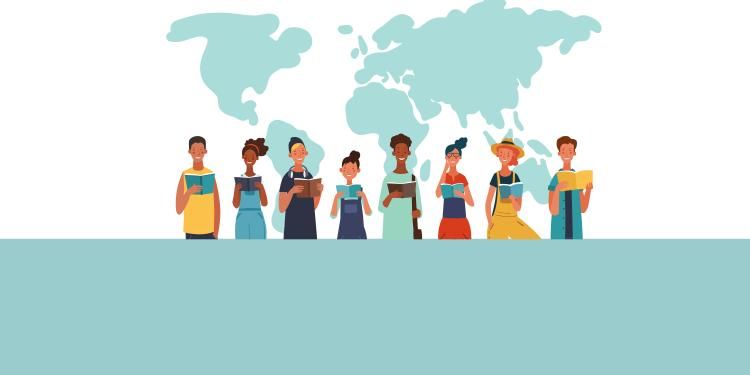
Reading list

Data compiled for the Booker Prize Foundation shows that readers of translated fiction in the UK are significantly younger than fiction readers generally – and that’s not all…
Data newly compiled by Nielsen on behalf of the Booker Prize Foundation shows that readers of translated fiction (TF) in the UK are significantly younger than readers of fiction generally, as well as revealing that a much higher proportion of male readers are buying translated fiction than fiction overall.
According to data from 2022 (the most up-to-date figures available), the largest purchase group for TF in the UK, when looking at male and female readers as a whole, is made up of 25-34 year-olds, which is a much younger cohort than the largest purchase group for fiction overall, which is aged 60-84.
25-34 year-olds purchased almost a quarter (24.9%) of all TF in the UK in 2022, an increase from 21% in 2021. The second highest purchase group is 13-24 year olds, which means that book buyers under the age of 35 account for almost half (48.2%) of all translated fiction purchases.
Conversely, people who are retired are much less likely to buy translated fiction. In 2022, only 8% of translated fiction buyers in the UK were retired, compared with almost a fifth (19.9%) of overall fiction buyers. The proportion of older readers buying TF is falling. In 2019, readers aged 60-84 (the oldest group surveyed) accounted for 20.9% of all translated fiction buyers. That number fell to 13.2% in 2022.
When broken down by gender, the largest purchase group for TF is females aged 13-24, with 15.5% of all purchases, followed by females aged 25-34 (13.7% of all translated fiction purchases). The next highest purchase groups are males aged 45-59 (13.6%) and males aged 25-34 (11.2%).
Olga Tokarczuk
© Lukasz GizaPercentage of translated fiction buyers in the UK under the age of 34
Percentage of the UK’s translated fiction buyers who are male
Percentage of the UK’s translated fiction buyers who are retired
Percentage of the UK’s translated fiction buyers who say they prefer a challenging read
Percentage of translated fiction buyers in the UK who are single
Percentage of translated fiction buyers in the UK who say they read for information or knowledge
Out of the 30 biggest-selling TF titles of 2022 are translated from Japanese
Number of translated fiction titles sold in the UK in 2022
The study, using the latest data from Nielsen’s Books and Consumers data (a monthly survey of 3,000 UK book buyers aged between 13 and 84), and which does not include sales of graphic novels, such as Japanese Manga, reveals several other stark differences between readers of fiction written in English and readers of fiction originally written in another language.
While only 32% of buyers of fiction generally are male, 48% of translated fiction buyers are male. With reports that young men are reading less fiction than ever, publishers and retailers will be encouraged to see a publishing sector in which male readers are on a par with females.
Buyers of translated fiction also tend to be more educated than buyers of fiction generally. 43.5% of buyers of translated fiction have an undergraduate degree, compared with 31% of buyers of fiction in general. In 2022, translated fiction buyers were also more likely to be in full time work (56.6%) than fiction buyers overall (43.7%), more likely to be single (49.9%, compared to 30.1%) and more likely to be living in the south of the UK (42.8%), although the number of translated fiction buyers in London is at its lowest percentage (22%) since 2019.
Translated fiction buyers are also more likely to be big consumers of non-fiction, compared to fiction buyers generally. In 2022, 21.6% of translated fiction buyers purchased more than six non-fiction books, compared to 8.2% of overall fiction buyers. When it comes to reading for information and knowledge, TF buyers (78.9%) score much higher than overall fiction buyers (59.1%). Translated fiction buyers (53.4%) are also more likely to say they prefer a challenging read than overall fiction buyers (37.2%). The TF buyer is less likely to prefer ebooks to printed books than the overall fiction buyer (14% vs 30%). One in three (30.1%) translated fiction buyers say they like to be the first to read new books, compared to one in five (21.4%) of fiction readers generally.
The International Booker Prize, which celebrates quality fiction translated into English from another language and published in the UK or Ireland, continues to be a major factor in the increased profile of fiction translated into English. In the nine months since winning last year’s International Booker Prize, Geetanjali Shree’s Tomb of Sand, originally written in Hindi and translated by Daisy Rockwell, sold around 25,000 copies. It had sold less than 500 copies before being nominated for the prize. Among the top 15 bestselling translated authors in the UK in 2022, four have been nominated for the International Booker Prize: Olga Tokarczuk, Andrey Kurkov, Mieko Kawakami and Elena Ferrante.
After a tumultuous two-year period where in-store footfall was dramatically affected by the COVID-19 pandemic, sales of translated fiction are bouncing back. In 2022, over 1.9 million copies of translated fiction were sold in the UK, an increase of 22% on 2021, and accounting for 3.3% of overall fiction sales. Titles translated from Japanese into English sold over 490,000 copies, making it the number-one original language for translated fiction sales in the UK. In 2022, 14 of the UK’s top 30 TF books were translated from Japanese, with three authors, including Mieko Kawakami, each having a hat-trick of novels in the top 30. Japanese is followed in the top ten of original languages by French, Russian, German, Italian, Norwegian, Spanish, Swedish, Portuguese and Chinese.
Mieko Kawakami

